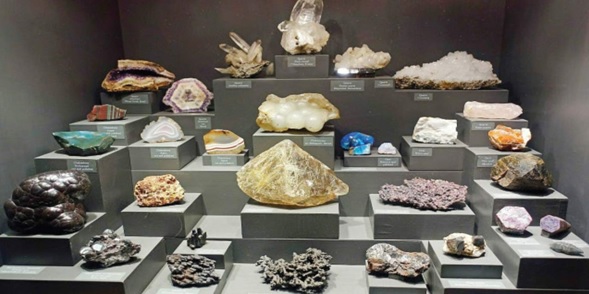
Ethiopia has a diverse range of mineral resources with significant potential for exploration and development. Key resources include gold, gemstone, potash, and various industrial minerals like iron ore and construction materials. The country also has potential for energy minerals like lithium, coal, and petroleum. While mining contributes a small percentage to the GDP, the government is working to boost its contribution to the economy.
The Ethiopian Mining Corporation has been operating in the mining sector for many years. In addition, it is providing training aimed at expanding awareness around minerals alongside its development, using its experience and expertise. Since last year, it has been providing training specifically on precious minerals; and the corporation’s information indicates that it has been accepting and training trainees in three rounds so far.
According to Yigzaw Simachew, Business Development Manager of the Ethiopian Mining Corporation, the precious minerals’ sector is the most important among other minerals. The corporation is also carrying out many activities with the aim of developing the sector. It mainly provides training that will build the capacity of those who are engaged in the sector and those who want to engage in it.
The training was launched in 2024; it was launched with the aim of creating awareness so that the sector does not face illegal trade and other problems, and to ensure that the country benefits from the sector. He also said that the corporation aims to create job opportunities and grow the sector through its efforts to fulfill its social responsibility.
The training includes theoretical and practical lessons on precious minerals. He explained that it will help them learn the science that allows them to identify precious and semi-precious minerals by color or shape. The main purpose of the training was to ensure that those entering the sector have the knowledge and skills to work, as precious minerals are an economic source.
He pointed out that it will create job opportunities for others. This will bring the economic benefits that the sector deserves. It will increase the foreign exchange earned by adding value. He also emphasized that the capacity of those engaged in the sector and those who want to engage in it should be built in the future.
As to him, the training will enable the export market to be supplied with value added precious minerals. Currently, value added precious minerals are being exported to the foreign market, and it is important to look at the sector carefully to increase it further.
The manager said that although the training will be given for few days (15 days), it will help the trainees to know the general things they need to know about precious minerals; and identify the sector to some extent. Since the sector is vast, more time needs to be given; there are works to be done in the future to expand the duration and content of the training.
He mentioned that the training has been provided to 59 trainees in three rounds so far; among them, the corporation has supported those who could not afford the training to study for free. Those who have taken the training can engage in their own business and create job opportunities for others; a favorable environment will be created for them to work together by participating in the future works of the corporation in various ways, he said.
He recalled that the training being provided is a short-term training; by accepting the feedback given by the trainees and improving the things that need to be improved, a larger time will be allocated for it in the future; it is planned to be provided widely at the institute level with an intensive workshop and laboratory. It will be widely implemented to make it accessible to everyone.
The corporation is currently in the initial stages of its operations; it will strengthen this by making the training center a sector and working to bring the industry to a better level. He explained that the corporation is providing training at a reasonable fee; those who want to engage in the sector; those who are working or interested can take the training at a reasonable fee.
It was also revealed that the corporation trained nine trainees in the third round. One of these trainees is Assefa Genetu. He is a tour guide by profession; he has been working as a tour guide for the past 15 years. He has now taken the short-term training provided by the corporation on general precious minerals.
Assefa said that although the profession he is working in and the training he received are not related; he took the training because he has a great inner desire to know and identify precious minerals.
he recalled that he had the opportunity to meet and get acquainted with precious minerals while traveling in various regions of the country as a tour guide, and he said that visitors from abroad, especially those who come to visit the country, have a high interest and attitude towards precious minerals. This has made him want to expand his understanding of the minerals and learn more about them.
He understood that it is important to recognize and share the precious minerals of the country with others, so he attended the training to gain this knowledge. Instead of hearing about the precious minerals found in Ethiopia from other countries, he decided to do something that would benefit both him and the country. He had made many efforts to get the training and was able to achieve what he had set out to do.
He had undergone a fifteen-day theoretical and practical training on precious minerals. The training provided him with a wealth of knowledge about the properties of precious minerals in the world; ways to enhance their value by beautifying them; and how to use them for jewelry. The training was designed to help him identify precious minerals and market them, including their value.
“Before I started the training, I only had a desire to know about minerals,” Assefa said; noting that interest is a path to knowledge, not knowledge itself, and that the training enabled him to understand and gain an understanding of precious minerals.
Ethiopia is one of the countries with the largest reserves of precious minerals in the world. It is especially known for its opal, after Australia, Assefa said. In addition to introducing these minerals to the world, it is necessary to make them a source of income by adding value.
Although it is known that the minerals are in high demand in the world market, he said that he will study the challenges and opportunities in the process and get to work. Continuing to make efforts to learn more about the minerals; he indicated that he has a plan to join the sector and export the minerals by adding value.
Assefa further said that it is very important to provide training to know and identify precious minerals well; this will strengthen the citizens in the profession and strengthen the work. It will also help to have law and order in the market; and it will also allow the country to benefit from the sector. Especially if geology and gemology courses are included in the curriculum and the education is provided from the bottom up, the profession will grow. In addition, it will change the economic outlook of the citizens and create job opportunities for many.
The other trainee is Hana Tadesse. She is a geologist; in addition to the knowledge she gained about precious minerals in geology, she said that she attended the training that will help her to identify the precious metals properly.
She explained that the training enabled her to learn about the minerals as she had expected and to have practical knowledge. She especially gained in-depth knowledge about adding value to the minerals. In the workshop, she learned how to process the minerals into jewelry and present them to the market.
“The training allowed me to learn more about the minerals than I had before,” Hana said; she explained that she learned the theory of precious minerals by touching, feeling, working, and processing them into jewelry. This helped her gain additional knowledge and skills; gaining another skill showed her great hope for a future career in precious minerals.
Currently, due to the lack of sufficient experts in the sector, precious metals are being exported without value addition. She explained that if those who work in the sector with experience or others receive such training, they will be able to add value to the minerals and produce them in the form of jewelry and offer them to the foreign market. This will allow the country to benefit from the sector. She mentioned that the Ethiopian Mining Corporation should continue to strengthen the training provided on precious minerals and thanked it for helping her receive the training free of charge.
BY BACHA ZEWDIE
THE ETHIOPIAN HERALD WEDNESDAY 25 JUNE 2025





